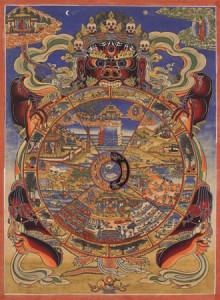
Theres a concept in Tibetan Buddhism (and I think used in other Buddhist traditions) called the Wheel Of Life. It’s a great mandala, showing the cycles of the world, clutched in the hands of Yama, lord of death. It’s a vast, symbolic work that you could spend ages analyzing as it represents the sources of suffering, the nature of living beings, and the liberation off the wheel.
Most notable – and famous – are the various realms of existence portrayed on the wheel. The lore states that there are six realms one can be born in:
Devas – The gods. Beings who enjoy bliss and pleasure and power. However, Devas do age and die, and their happiness often means they don’t develop wisdom or compassion.
Asuras – The Angry Gods, sometimes translated as “Titans”. They conted with the Devas. Powerful, fierce, and forceful they’re also jealous and paranoid.
Humans – That’s us. We’re usually ignorant, but also are in a balanced world and state where we can learn wisdom, compassion, and get off the Wheel via enlightenment. We’ve got anger and bliss and so forth, but it’s not overwhelming or crippling.
Animals – The realm of creatures of instinct. Animals tend to prefer sameness, indulge desire, and often lack humor.
Hungry Ghosts – The realm of addiction. Hungry Ghosts are mournful spirits haunting various desolate parts of the world, seeking to consume things they desire and unable to enjoy them. Scary-looking, they’re rather pathetic creatures.
Hell Beings – The realm of fear and anger. Hell beings are born to torment in this horrible realm.
Metaphysically it’s an interesting cosmology, but it can also be viewed as metaphorical – that these are different psychological states we can experience. I’ve seen the psychological model talked about by a number of people, such as Mark Epstein and Pema Chodron; it’s really fascinating.
